AI-powered nutrition apps are changing how we manage our diets and health. These tools analyze meals, track nutrients, and offer personalized recommendations, making it easier to address nutritional deficiencies. Here’s a quick look at five standout apps:
- What The Food: Free app using photo recognition to analyze meals and suggest recipes. Tracks both macro and micronutrients.
- NutraForge: A speech-based tracker ($9.99/month) that identifies nutrients and creates custom meal plans.
- Nutemi: Launched in 2025, offers image-based tracking and detailed nutrient analysis. Plans start at $15/month.
- NutriScan: Provides in-depth nutrient tracking, meal plans, and lab integration for $12.99/year.
- Intake: Combines photo and voice tracking with fitness tracker integration. Plans start at $8.99/month.
These apps simplify nutrition tracking, helping users make informed dietary choices while addressing potential health gaps.
I Tested AI Meal Scans, and The Results Are SHOCKING!
1. What The Food
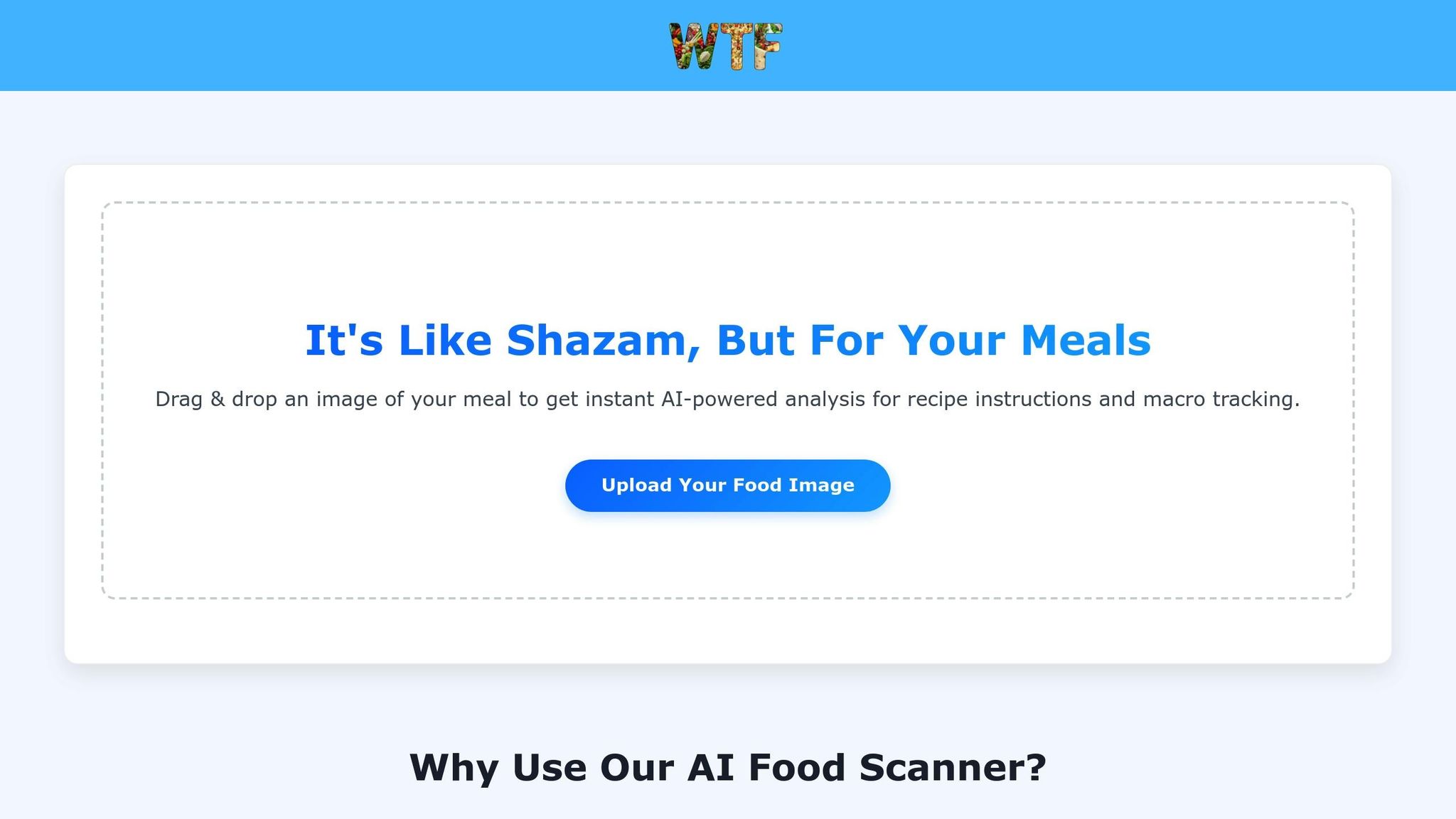
What The Food is making waves in the world of AI-powered health tools by simplifying the way we track and improve our nutrition. This free app combines cutting-edge food recognition technology with detailed nutritional analysis, offering a straightforward way to identify and address dietary needs. Forget the hassle of traditional tracking methods – this app streamlines the process, making better eating habits more accessible for everyone. Let’s take a closer look at the standout AI features that power this app.
AI-Driven Food Recognition
The app uses advanced computer vision and deep learning to analyze food images. When you upload a photo of your meal, the AI works through multiple steps: identifying the presence of food, breaking it down into individual components, and estimating portion sizes. This is all made possible through convolutional neural networks (CNNs) and other deep learning techniques.
What’s impressive is the level of detail it can achieve. The system can differentiate between ingredients in even the most complex dishes and uses precise volume and area measurements to estimate portion sizes. Current food recognition systems boast detection accuracies ranging from 74% to 99.85%, with nutrient estimation errors typically staying within a 10% to 15% margin. This level of precision helps users make smarter, more informed choices about their meals.
Macro and Micronutrient Tracking
Once the app identifies your food, it doesn’t stop there. It dives deeper by tracking both macronutrients – like calories, protein, carbs, and fats – and micronutrients, including vitamins and minerals that are often overlooked. The app relies on trusted sources, such as the US Department of Agriculture (USDA) nutritional database, to provide a complete nutrient profile for each food item. These insights give users a clear picture of their eating habits and help pinpoint areas that need improvement.
Personalized Nutritional Recommendations
What The Food goes beyond just tracking your meals. It also offers tailored recipe suggestions to help you meet your nutritional goals. By analyzing your meal data, the app identifies gaps in your diet and recommends recipes to fill those voids. You’ll get meal ideas with serving size recommendations and straightforward preparation instructions, ensuring your nutritional needs are met without complicating your cooking routine.
2. NutraForge
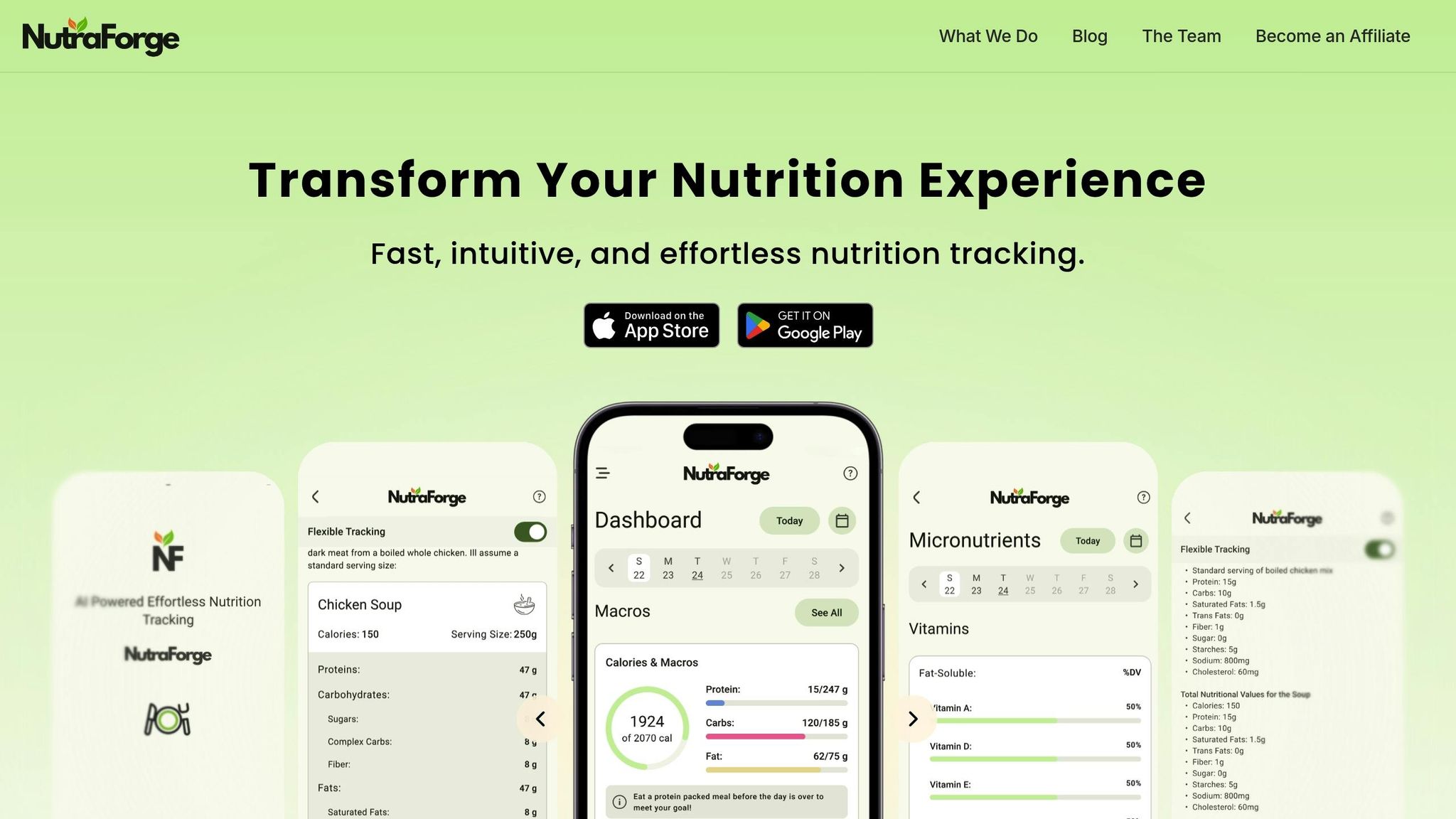
NutraForge takes a different path compared to most tracking apps that rely heavily on image analysis. Instead, it uses speech-first technology for meal logging. By incorporating speech recognition, NutraForge offers a conversational and intuitive way to track meals. Pricing is straightforward: $9.99 per month or $99.99 annually. It currently holds a perfect 5.0 rating from seven reviews on the App Store. This innovative method serves as the foundation for its advanced AI features.
AI-Driven Food Recognition
NutraForge uses machine learning to power its speech recognition, allowing users to describe their meals naturally. The app processes these descriptions to identify nutritional details, breaking them down into precise components. With access to a database of over 5 million foods, it simplifies meal logging and can save users up to five minutes daily. It’s designed to recognize both the obvious and subtle nutritional elements in a meal, making tracking effortless.
Macro and Micronutrient Tracking
NutraForge doesn’t stop at basic calorie and macronutrient tracking. It provides an in-depth analysis of over 40 micronutrients, including essential vitamins and minerals like iron, vitamin C, and vitamin D. This comprehensive breakdown ensures users have a clear picture of their nutritional intake, covering elements that traditional trackers often miss.
Personalized Nutritional Recommendations
Going beyond tracking, NutraForge offers tailored nutritional advice. It identifies potential nutrient gaps and creates weekly meal plans aligned with specific goals, such as weight management, muscle growth, or addressing particular health concerns. The app dynamically adjusts its recommendations based on user input, ensuring an ever-evolving and personalized approach to nutrition.
3. Nutemi
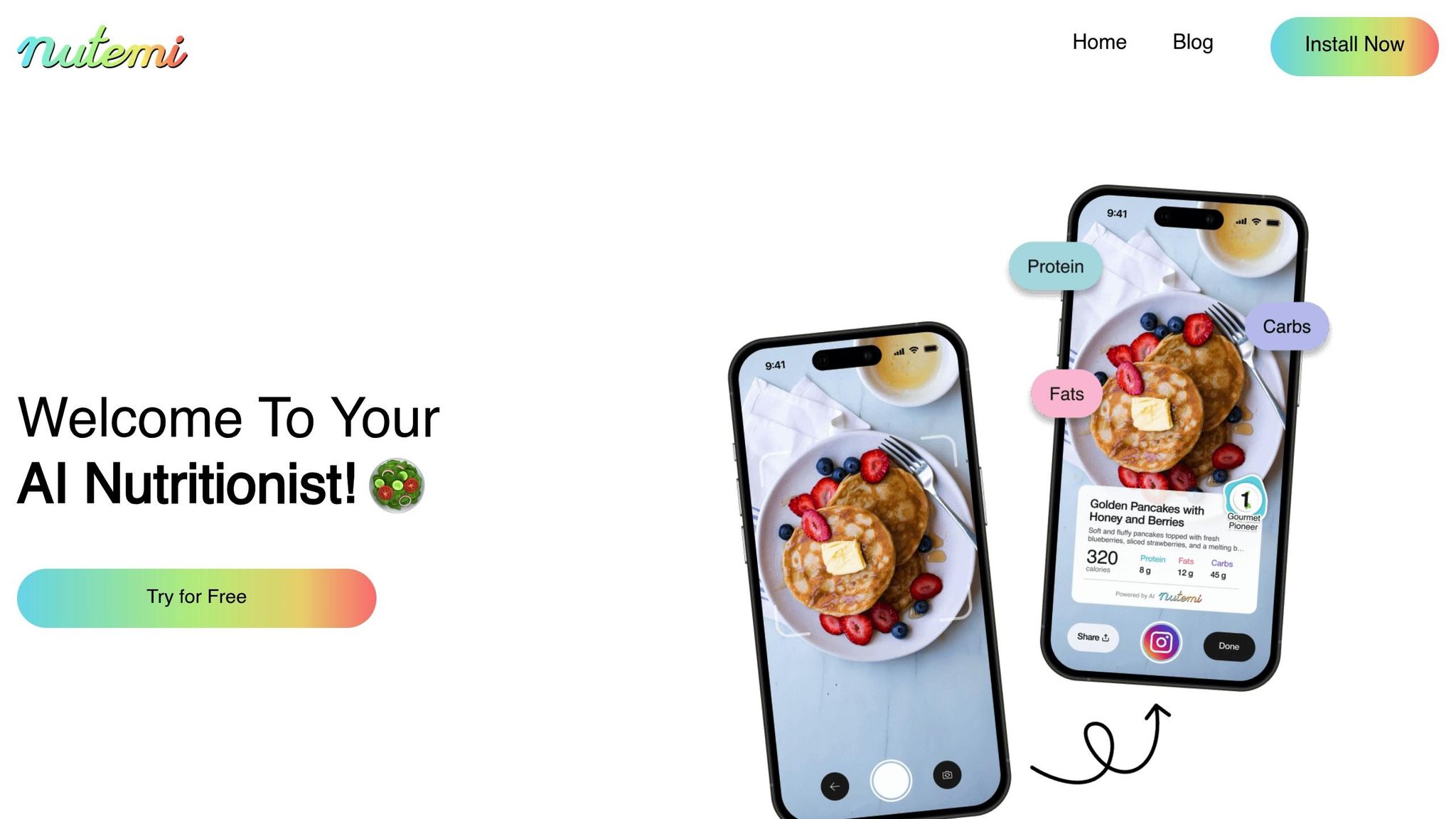
Nutemi hit the scene on April 1, 2025, and quickly made an impression, earning a perfect 5.0 rating on the App Store from seven reviewers. This app combines advanced AI-powered image recognition with in-depth nutritional analysis, offering two subscription options: a basic plan for $15/month and a premium plan priced at $49/month (billed annually). Here’s a closer look at what Nutemi brings to the table.
AI-Driven Food Recognition
Using cutting-edge AI technology, Nutemi can identify food items through photos and barcodes, providing quick and accurate nutritional estimates. Whether it’s a home-cooked meal or a packaged snack, the app delivers insights with ease:
Simply snap a photo of your dish, and Nutemi’s AI analyzes the image to estimate calories and key nutrients.
This feature simplifies food tracking, making it more approachable for everyday use.
Macro and Micronutrient Tracking
Nutemi goes beyond just calorie counting. It offers a detailed breakdown of macronutrients – protein, carbs, and fats – as well as essential vitamins and minerals. All this information is displayed in its user-friendly Statistics screen. Users have praised the app for making complex nutritional data easy to understand.
Personalized Nutritional Recommendations
Nutemi doesn’t stop at tracking; it also provides tailored meal plans based on user profiles. By analyzing individual goals, dietary needs, and restrictions, the app crafts meal suggestions that fit seamlessly into users’ lifestyles. It even adjusts for allergies and other specific requirements. Beyond meal planning, Nutemi’s AI insights help users see how their food choices impact their overall health.
One reviewer summed it up perfectly:
I’ve tried many calorie counting apps, but most of them are either super annoying to use or just too much work. Nutemi is different. It’s actually easy. – DrBongoKongo, App Store Reviewer
With its intuitive design and powerful AI features, Nutemi offers an approachable yet comprehensive way to monitor and manage nutritional health.
sbb-itb-034be4e
4. NutriScan
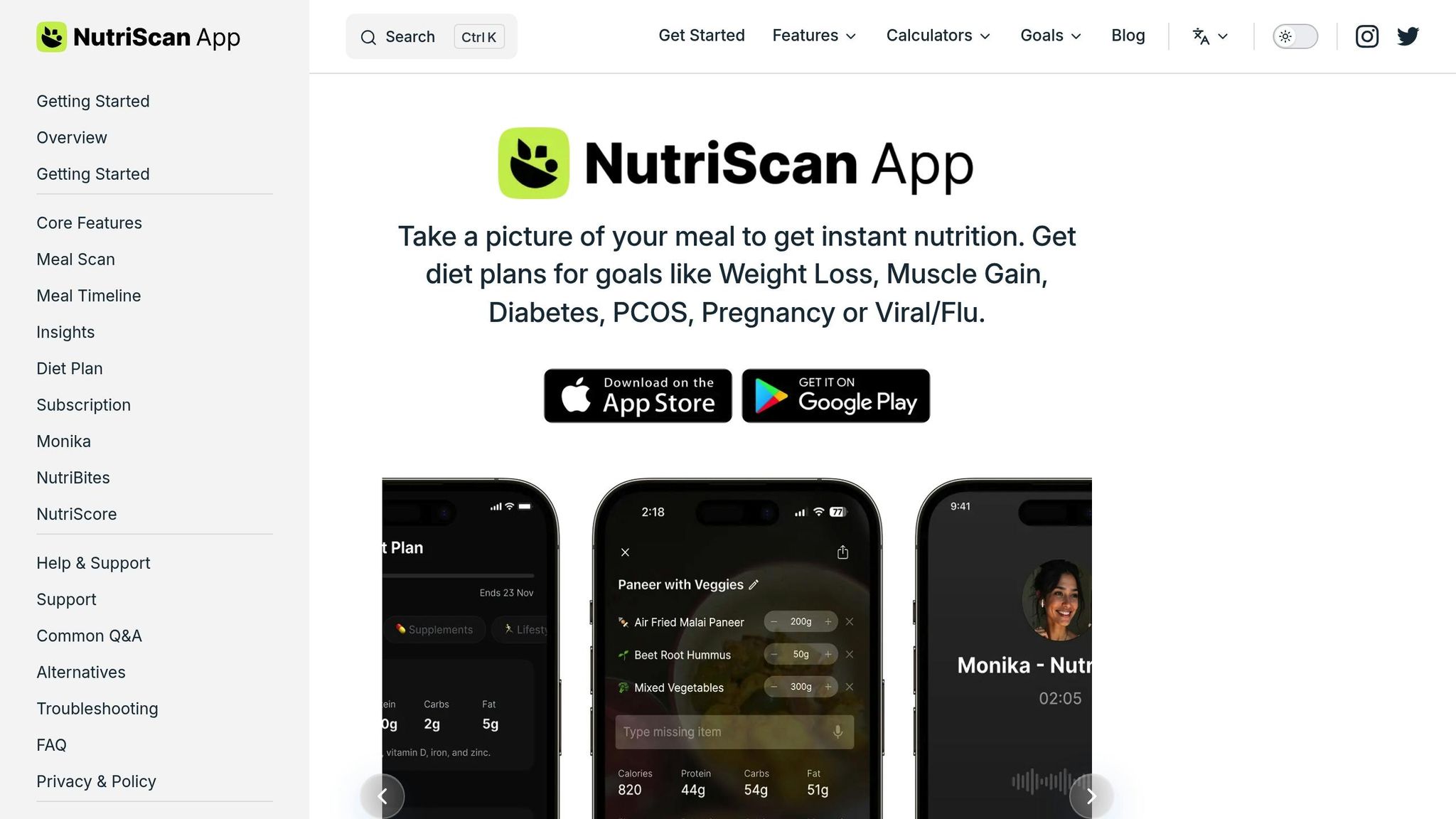
NutriScan acts as your personal AI nutrition coach, boasting an impressive 4.8/5 rating and delivering detailed nutrient analysis to help users identify and address their nutritional needs.
AI-Driven Food Recognition
NutriScan’s AI achieves over 95% accuracy in identifying foods and 90% accuracy in estimating portions. It analyzes food type, cooking method, oil content, and portion size to instantly provide calorie and nutrient breakdowns.
Trained on dishes from around the world, the app can recognize everything from homemade meals to restaurant dishes and street food. Whether it’s a complex recipe or a mixed plate, NutriScan handles it effortlessly. For even more accurate results, users can add details like portion sizes or preparation methods. And if snapping a photo isn’t your thing, the app also supports manual and voice logging options. These features make tracking your nutrition both flexible and precise.
Macro and Micronutrient Tracking
Using its food recognition capabilities, NutriScan delivers 93% accuracy in nutrient calculations, offering a detailed breakdown of calories, protein, carbs, fat, and four key micronutrients. It even provides a nutrition score based on factors like nutrient density, macronutrient balance, glycemic load, food processing levels, and hydration.
Users can set calorie or macronutrient goals and monitor their progress through daily, weekly, and monthly charts, complete with color-coded feedback for clarity. The app also accommodates various dietary preferences, including keto, vegan, and gluten-free, tailoring its insights to suit individual eating habits.
Personalized Nutritional Recommendations
NutriScan’s Diet Plan feature uses a thorough questionnaire to create customized meal and supplement suggestions. These plans are adjustable every 28 days, ensuring they stay aligned with user goals. The AI nutritionist, Monika, provides expert guidance for objectives like weight loss, muscle building, or managing conditions such as diabetes and PCOS.
The app’s success rates are impressive: 85% for weight management, 80% for muscle gain, 90% for improved nutrition, and 87% for overall health enhancement. Premium features are offered through subscription plans, priced at $12.99 annually for the introductory plan or $7.49 monthly.
To get the most out of NutriScan, users should complete the questionnaires with care, log all meals consistently, and review their progress regularly to make any necessary adjustments.
5. Intake
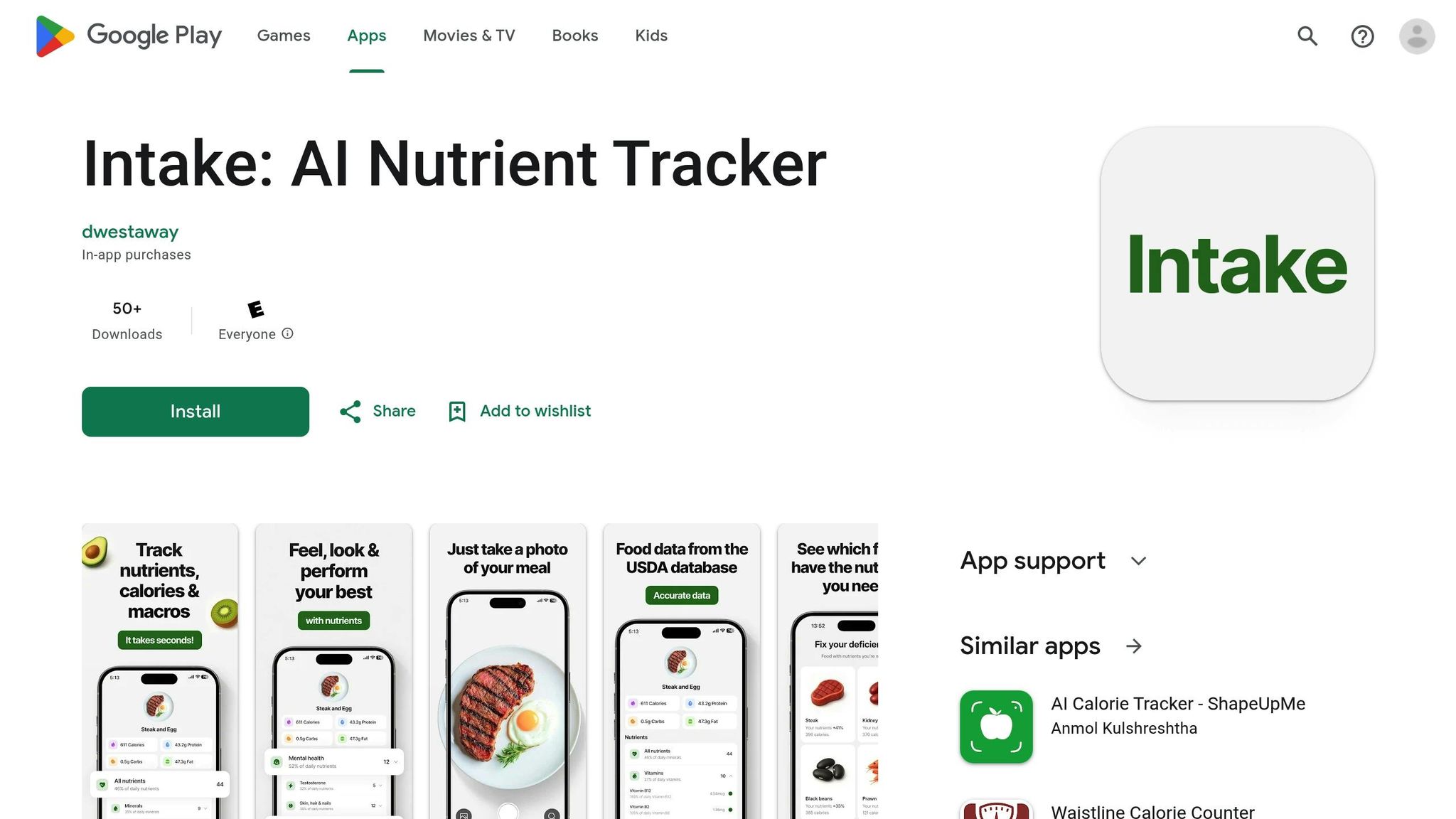
Intake brings a fresh take on nutrition tracking, going beyond simple calorie counting to offer AI-powered guidance tailored to your health goals and lifestyle shifts.
AI-Driven Food Recognition
Using advanced computer vision, Intake can identify food items from photos and estimate portion sizes with impressive accuracy. Snap a picture of your meal, and the app delivers a detailed breakdown of both macronutrients and micronutrients. If snapping a photo isn’t an option, no worries – Intake also features voice-powered tracking, making it easier to log meals on the go.
Macro and Micronutrient Tracking
This app doesn’t stop at calories. Intake tracks both macro and micronutrients to help identify nutritional gaps. Research shows that logging meals three times a day with tools like this takes an average of 14.6 minutes daily and can lead to a 10% reduction in body weight over six months. Its user-friendly design encourages consistent tracking without feeling like a chore.
Personalized Nutritional Recommendations
Once your meals are logged, Intake’s AI goes to work, analyzing dietary patterns to create customized diet plans. Whether you’re dealing with nutrient deficiencies or specific health goals, the app suggests foods and recipes that fit your needs. It even factors in allergies, dietary restrictions, and intolerances. A study found that AI-driven dietary chatbots improved adherence to nutrition plans by 32% compared to traditional counseling. With real-time feedback, the app adjusts its recommendations as your health evolves, suggesting foods or supplements to address deficiencies.
Integration with Health and Fitness Platforms
Intake takes things a step further by syncing with wearables and other health devices. By connecting to fitness trackers, smartwatches, and health sensors, the app gathers real-time data on activity levels, sleep, and other metrics. This integration allows its AI to fine-tune meal plans based on your daily routines. According to an MDPI study, platforms that integrate AI with health devices saw a 9.8% reduction in data processing time, leading to better health outcomes and quicker issue detection. The app’s real-time adjustments are particularly useful for managing glucose levels and supporting heart health.
App Comparison Table
Choosing the right AI-powered nutrition app for tracking deficiencies can feel overwhelming, but comparing their key features side by side makes the decision easier. Below is a table that highlights the standout features of five popular options.
| Feature | What The Food | NutraForge | Nutemi | NutriScan | Intake |
|---|---|---|---|---|---|
| AI Food Recognition | Photo-based detection with multi-item analysis | Advanced computer vision for 40,000+ ingredients | Visual food identification with portion estimation | Barcode scanning plus photo recognition | Photo and voice-powered tracking |
| Nutrient Tracking Depth | Comprehensive macro and micronutrient analysis | Full spectrum including rare nutrients | Focus on essential vitamins and minerals | Detailed micronutrient profiling | Both macro and micronutrient tracking |
| Personalization Level | Recipe generation based on dietary needs | Customized plans for metabolic conditions | Tailored recommendations for deficiencies | Personalized alerts for nutrient gaps | AI-driven diet plans with real-time adjustments |
| Health Integration | Basic health insights and serving size estimation | Sync with glucose monitors and blood pressure devices | Wearable device compatibility | Integration with lab test results | Sync with fitness trackers and smartwatches |
| Pricing (USD) | Free with premium options | $29.99/year | $24.99/year | $69.99/year | $8.99/month or $29.99/year |
| Primary Benefit | Free comprehensive food analysis | Medical-grade accuracy for chronic conditions | Affordable deficiency prevention | Professional-level nutrient monitoring | Holistic health tracking with real-time feedback |
| Best For | General nutrition tracking and recipe ideas | Managing diabetes and metabolic disorders | Budget-conscious users seeking deficiency alerts | Serious health monitoring and lab integration | Active individuals wanting complete health integration |
Looking at the table, it’s clear that these apps cater to different needs. Pricing spans from free options to annual subscriptions, with What The Food standing out as a no-cost choice for comprehensive food analysis. On the other hand, apps like NutriScan and Intake offer advanced integrations with wearables and lab results, ideal for those looking for more detailed health insights.
Nutrient tracking also varies widely. While What The Food provides a balanced mix of macro and micronutrient tracking, NutriScan dives deep into micronutrient profiling, and NutraForge includes even rare nutrients in its analysis. These differences highlight how each app tailors its features to specific user goals.
One of the most impressive aspects of these apps is their ability to personalize meal plans in real time. Unlike static recommendations, this dynamic approach ensures that users can address nutritional deficiencies as they arise, making it easier to stay on top of health goals.
The global AI-powered personalized nutrition market is expected to hit $4.26 billion by 2032, growing at an annual rate of 18.19% between 2025 and 2032. With such rapid advancements, selecting the right app means finding the one that aligns with your health priorities, budget, and technology preferences.
Conclusion
AI-powered nutrition apps are transforming the way Americans identify and address nutritional gaps. These tools go far beyond basic calorie tracking, offering insights into overall health that were once only available through costly medical tests and consultations.
The impact extends beyond individual users. For the healthcare industry, these apps represent a cost-effective way to tackle widespread nutritional deficiencies. Data from five Geisinger hospitals reveals that about 10% of admitted patients suffer from some form of nutritional deficiency. Early intervention through these technologies could help address such issues before they escalate.
With cutting-edge accuracy and a focus on personalization, these apps are reshaping nutritional care. AI systems excel at identifying foods and their nutrient content with near-perfect precision. Studies have shown that their use can lead to notable improvements in managing conditions like diabetes, with increased remission rates and symptom relief across various health issues. This level of effectiveness signals a shift toward proactive health management.
What sets these tools apart is their ability to provide actionable insights by analyzing complex data – from genetics to microbiome and environmental factors. Unlike traditional methods that rely on error-prone self-reported information, AI-powered platforms deliver tailored dietary recommendations based on a more comprehensive understanding of the user’s needs.
The growing acceptance of these technologies among healthcare professionals underscores their importance. In 2024, 66% of physicians reported using healthcare AI, a significant rise from 38% in 2023. This surge highlights the increasing role of AI in modern healthcare strategies.
For Americans juggling busy lives, these apps offer a practical, user-friendly way to maintain better nutrition. Whether you’re managing a chronic condition, addressing specific deficiencies, or simply striving for better health, AI-powered nutrition apps provide the personalized guidance and real-time feedback needed to make meaningful dietary changes without the hassle of traditional planning.
FAQs
How do AI nutrition apps provide accurate nutrient tracking and recommendations?
AI-powered nutrition apps rely on advanced machine learning models trained on vast food databases to deliver precise results. These models can analyze food images, recognize ingredients, and estimate nutrient content, all depending on the app’s data quality and the sophistication of its AI. To enhance reliability, many apps work closely with dietitians during development and regularly update their databases to include regional and cultural food variations.
That said, occasional errors still happen – like underestimating calorie or fat content or overestimating protein levels. Developers are constantly refining these systems to offer users more accurate and tailored nutritional insights.
How can an AI-powered nutrition app help people with dietary restrictions or specific health goals?
AI-powered nutrition apps are a game-changer for anyone navigating dietary restrictions or striving to meet specific health goals. These apps use your personal data – like eating habits, activity levels, and nutritional needs – to craft meal plans tailored just for you.
What makes them even more helpful is how they keep you on track. From tracking your progress to sending reminders and suggesting meals, these apps are like having a personal nutrition coach in your pocket. Need to avoid allergens or hit specific macronutrient goals? No problem. The app can guide you and even whip up recipes that match your needs. This level of personalization takes the guesswork out of nutrition, making it easier to stick to your plan and reach your health goals.
How do AI nutrition apps work with fitness devices to create a complete health tracking experience?
AI nutrition apps work hand-in-hand with health and fitness devices like smartwatches, fitness trackers, and continuous glucose monitors, offering a comprehensive look at your health. By integrating with these tools, the apps gather data on activity levels, heart rate, and even blood sugar patterns to provide customized nutritional guidance.
Some apps take it a step further by syncing with smart scales and environmental sensors, allowing them to track weight, body composition, and external factors that could influence your health. With this wealth of data, the apps provide real-time feedback and tailored suggestions, helping you stay on top of your nutrition and overall wellness.
